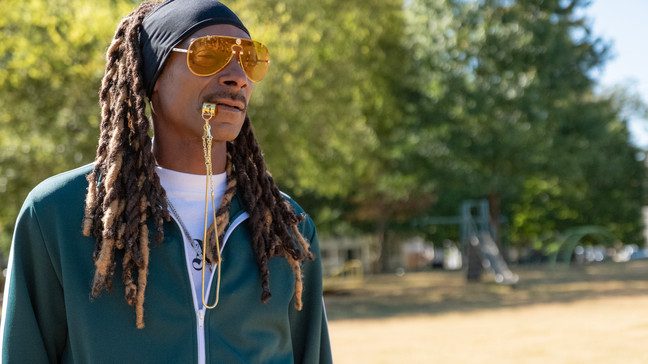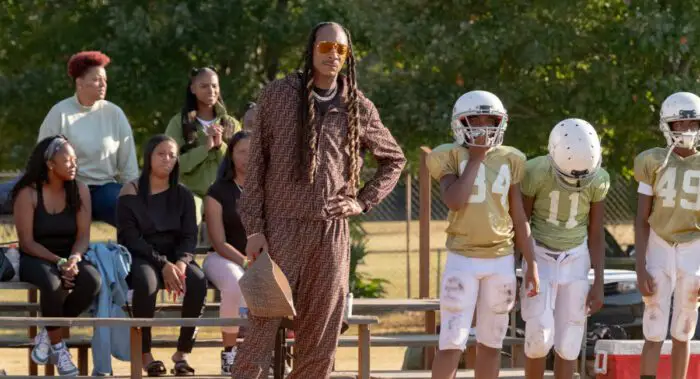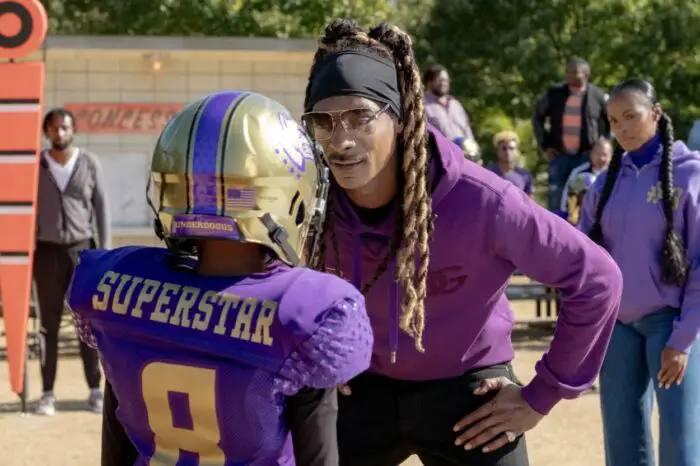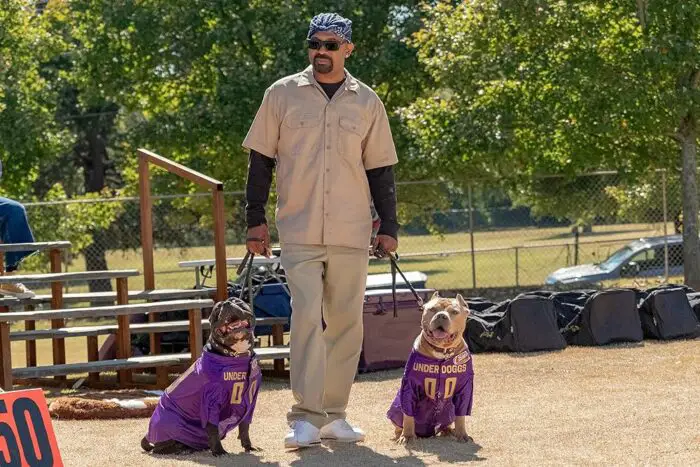Charles Stone III’s The Underdoggs, starring Snoop Dog, Mike Epps, and George Lopez, is a bizarre, postmodern addition to the kids-centered sports movie genre. Self-referentially steeped in the lore of The Might Ducks, Little Giants, The Big Green, and other ’90s classics, only raunchier, The Underdoggs is a nonstop homage to a trove of millennial-friendly VHS classics. It is filled with direct callbacks and subtle winks, such as the scene where Snoop Dogg drives a gold-plated Mercedes SUV onto the football field in the same vein Emilio Estevez infamously directed his limo driver to park on the Minneapolis ice in the first Mighty Ducks movie.
The fact that The Underdoggs is steeped in the sports genre is not surprising once one realizes Charles Stone III directed it. Very quietly, Stone has carved out a niche within this culturally marginal albeit ever-enduring genre. Over the past few decades, Stone has directed everything from Drumline (a coming-of-age story that focuses on the cutthroat competitiveness of university drum sections in the American South) to Mr. 3000 (a Bernie Mac vehicle about a retired Major League Baseball star who returns to the big leagues in his late forties to reach the 3,000 hit milestone) to Uncle Drew (a sports comedy loosely based on a long-running Pepsi Max ad).
With Uncle Drew, Stone worked on a plane similar to The Underdoggs. That film exhibited shaggy, good-time silliness that shined through the overly self-serious, CGI superhero summer box office of 2008. Chronicling a band of grey-haired has-beens entering a street ball tournament, the film featured a cast of NBA all-stars that included Kyrie Irving, Shaquille O’Neal, Chris Webber, Reggie Miller, Nate Robinson, and Lisa Leslie. It knew it was a hang-out film with famous athletes in ridiculous makeup and wigs, and as such, it was a winning comedy.
Here, Stone teams up with another crossover celebrity in Snoop Dogg (fresh off an underrated performance in Netflix’s Day Shift), who pitched the idea for the film, produced it, and serves as the main protagonist. Playing Jaycen Jenning, a prima donna ex-NFL wide receiver with a megalomaniacal sense of self (he stocks his cabinets with Wheaties boxes featuring the one and only), Snoop’s iconic lankiness fits the aged wide receiver role to a tee. Jenning is a familiar mixture of sportive archetypes for anyone who keeps up with the Antonio Browns, Terrell Owens, and Deion Sanders of the NFL. He’s an over-the-hill narcissist, banking in on his former celebrity by podcasting in his lavish LA mansion. After he accidentally gets into a car accident, he becomes a cinematic stereotype: a reincarnation of Gordon Bombay, sentenced by an unforgiving judge to months of community work for an LA Community County Outreach program.

At first, Snoop is simply ordered to pick up trash, but when he spots a ragtag youth football team and starts to eye one of the players’ prepossessing mothers, a nurse named Cherise (Tika Sumpter), his community service interests turn to coaching, and he quickly pivots his community outreach from trash to pigskin pedagogy. This shift leads The Underdoggs into one of the more orthodox setups in kids-based sports movies. From Keanu Reeves in Hardball to Walter Matthau in The Bad News Bears to Emilio Estevez in The Mighty Ducks movies, the genre is jam-packed with coaches in desperate need of the humility and absolution that comes with teaching a misfit, outcast pack of preteen dweebs and rejects.
The rest of the film plays out accordingly, hitting a highlight reel of comforting tropes and expected beats. There’s an Annexation of Puerto Rico-inspired trick play. There’s an asthmatic kid with an overbearing, neurotic mom like the diminutive snot-bubble dweeb in Little Giants. There’s a pool party where the team gets drunk (i.e., the Big Chief tobacco-chewing night out at the fair in The Sandlot). There’s a kid who likes Game of Thrones and D&D; another whose parents think he’s at Mathletes; and a large swathe who act like wannabe gangsters, donning durags and red bandanas and dissing other kids for rocking Payless sneakers. There are conflicting temptations between coaching for genuine altruism and selfish motivations (as Jennings cunningly launches the Pee-wee football endeavor into a positive PR campaign, landing himself a spot on NFL Today).
For most of the runtime, I fixated on a throwaway moment early in the film wherein Jennings’s character arc undergoes a dramatic transformation after receiving sagacious advice from his longtime mentor, Coach Feis (George Lopez). Basically, Feis uses a raggedy old coach in his office as a metaphor for sticking by the things you care for. Jennings, high as a kite, is taken aback by the analogy and compliments his mentor, calling him the “Jedi Gandhi of this coaching sh*t.”
It is a functional exchange, but its brevity was startling, and the celerity with which Jennings achieves clarity got me thinking about how much it epitomizes a subtle shift in storytelling that’s become rampant in today’s pastiche-heavy world-building. Jennings’s lightbulb moment is not problematic in itself. From the get-go, it was clear he’d overcome his self-defeating vanity while getting advice from a former coach. What was clumsy was the speed at which this progression manifested, making the entire ordeal feel unearned. It is as if the scene, which should be played for dramatic character development, felt so routine that the filmmakers got impatient with rehashing the same conventional emotional trajectory we’ve all witnessed many times before. So instead of remaining loyal to the cadence of the narrative, the creative team (whether it was the script or direction is beyond me) chose to elide and skip the dialogue we’re accustomed to hearing altogether, leaving us with the odd sensation of observing a character achieve a philosophical breakthrough with zero effort.
Startled by the scene’s brevity, I began contemplating the facile archness of mainstream comedies that rely heavily on allusions. As disposable as The Underdoggs may seem, it belongs to a larger trend of postmodern studio releases that try to gain kudos and seem hip by poking fun at their genre forbears (Lego Movie, 21 Jump Street, Isn’t It Romantic?, Anyone but You, etc.). Somewhere along the way, poking fun at the past led to mocking the laws of natural character development and emotional honesty. Too “meta” and snarky to fully dramatize formulaic plotting, countless films began to breezily shoehorn old-fashioned storylines into their runtime with a distancing smirk of arrogant self-awareness. Too cool to echo trite and predictable emotional beats, the subgenre evolved to nudge at timeworn tropes from afar, glossing over their meatier elements via a shorthanded treatment.

In many ways, this maneuver is economic and lean: after all, why should we linger on a narrative redundancy? But in other ways, it feels cheap and, consequently, cheapens the films’ emotional integrity. Skipping over character development is a precarious shortcut. If done with a smugness or a presumptuous impetuosity, it comes across as cheating: it makes the humanity at the center of the script feel hollow, myopically undercutting the emotional weight the film should hypothetically carry. The eagerness to get to the next joke and omit anything in between forgets that audiences still need to feel the rhythms of an emotional journey at an atavistic/core level, as contrived as such refrains may be. We may all agree that the formulas are played-out and maudlin, but without them, there’s often a glaring absence: a thin skeleton and faint sketch of something that once had flesh, substance, meaning.
I know it’s odd to jump onto a soapbox and rant about such a forgettable moment in a knowingly lightweight movie, but the slovenly decision to condense the hackneyed emotional beats in The Underdoggs made manifest a macro trend I’ve noticed with recent meta-comedies across the spectrum. The genre pastiches falling victim to this foible and still working are a rarity; they succeed by balancing referential quips with a rapid heartbeat, achieving depth within brevity. These films shrewdly recycle genre signposts while simultaneously honoring the old-fashioned ethos of dramatic storytelling. And by juggling the two, they retain just enough gravitas to leave audiences laughing and feeling. The stuff that doesn’t work on all levels (and this makes up the overwhelming majority of postmodern comedies) thinks itself entirely above the material it is lampooning and thus settles for callow curation, churning out a compilation of sampled material or greatest hits.
Greatest hits-style movie mashups can be intermittently entertaining and often exciting, and I don’t doubt that we’ll one day be acclimated to their sloppy pacing and skeletal narrative framework. Still, more often than not, they feel superficial and vapid. We may grow nostalgic for their emotional rhythms (or lack thereof) and facetious tonality in due time; for now, however, the public consensus seems to be turned off by such genre outings, a fact that is reflected in the overwhelming critical panning such genre fare tends to receive. Left pining for a film that reconciles glib self-awareness with elements that may feel platitudinous but are still absolutely necessary for the themes to resonate, the zeitgeist dismisses the entire subgenre of modern sports comedies wholesale, reducing them to half-baked larks manufacturing dated movie magic while pretending to be above the very thing they’re copying.
Haphazardly blending tropes to bank in on nostalgia doesn’t cut it; nostalgia is a powerful narrative vector. However, it must be coupled with sincerity, or the payoff feels nonexistent: post-structurally savvy yet insultingly post-human. Sure, superficial postmodern stories can often work as an intellectual exercise. But they don’t fare so well outside avant-garde experiments or auteurist irony. When it comes to middle-of-the-road genre fodder, clever genre gimmicks, and Easter Egg conceits augment the text with a sense of history and humor, but they should not completely take over and replace the melodramatic indulgences. The syntax of dramatic plotting is in place for good reason. Too frequently, screenwriters try to outsmart archetypal conventions at their peril, forgetting to convey the basic, idiomatic displays of emotion that evoke timeworn poignancy.

Nevertheless, for what The Underdoggs wants to be, it succeeds in fits. For the most part, it’s a bawdier, naughtier update of the 90-minute sports movie comedy tracking an eclectic ensemble of one-dimensional preteens and a coach in need of redemption. Perhaps the film’s most enticing novelty is the heavy inclusion of swear words. In reality, kids are not PG-friendly. They are a puerile bunch: they cuss, act rowdy, and talk dirty all the time. The Underdoggs leans into this reality. With a tagline that reads “from blunts to runts,” the film leans heavily into titty-positive puns, juvenile insults, and mouthy disses, and it does so with glee. Respecting the uncouth contours of youthful vernacular (much like the recent Good Boys), the footballers in the film are completely unfiltered, freely delivering endless NSFW one-liners and eliciting intermittent chuckles. Unlike the Disney movies that The Underdoggs is riffing off, where the expletives are heavily bowdlerized into something falsely family-friendly, this feels authentic for commingling an R-rating with what was traditionally a PG entry.
In addition to playing off sports comedies, The Underdoggs also aligns with the comedic sensibility of the LA gangster comedy subgenre, a la Friday. To drive this conspicuous association home, Mike Epps plays Jaycen Jennings’ assistant coach and comedic sidekick Kareem, a petty thief/wannabe gangster who carries a gun with him everywhere (their meet-cute reunion entails a Kareem carjacking Jennings and realizing he’d jumped inside the SUV of his old high-school friend). Throughout the film, Kareem remains comedically and behaviorally unhinged. He robs and blackmails Jennings again (this time intentionally), gets shot with a gun he thought was unloaded (causing him to “lose 350k pounds of blood”), and jokes about having “enough THC” on hand “to make a nun get naked.” He even gets to make the most direct nod to The Mighty Ducks, entreating Jennings to “Emilio Estevez that ass” in reference to Bombay’s courtship of Charlie’s mom.
Throw in a romantic subplot between Jennings and Cherise that feels inconsequentially cozy, a ton of fun extracurricular shenanigans, constant shit-talking, a whitewashed rival coach who’s also a prominent voice on the podcast circuit, a subplot involving a female football player posing as a boy (see: a storied tradition of sports-based cross-dressing that has reappeared in everything from Ladybugs to She’s the Man), another subplot involving a smart player who has to lie to his parents to stay on the team (see: The Little Giants, The Big Green), a surfeit of product placement (everything from Fox Sports to Wienerschnitzel to Raising Canes gets some screen time), an adorable team mascot duo (two pit bulls with Under Doggs jerseys), a big jersey reveal (see: The Big Green), a brief relapse where Jennings temporarily loses sight of his moral compass, and a pretty decent halftime locker room speech, and The Underdoggs satisfies a long list of the genre trappings. It even has a savvy, topical commentary on white suburban entitlement, socioeconomic disparity, and systemic racial inequity (when the refs rig the game, they have to work “twice as hard […] because the system is always stacked against [them]”),

Perhaps most of all, the end message seems slightly unique. After coming up just short of a comeback victory, Jennings’ Pop Warner team takes the defeat in stride, proclaiming: “Don’t get it twisted—we will f*ck your motherf*ckers up next season. One defeat only makes an underdog hungrier.” While losing the final game is not entirely uncommon for a mainstream sports movie, the team’s takeaway after the loss adds an intriguing ethical twist to the mix. The Under Doggs are not merely consoled because they can dust themselves off and seek vengeance next year. They become imperviously content by the end, realizing attitude and perspective are everything. Despite losing, they celebrate center field, causing their victorious rivals to grow flabbergasted and flummoxed. By defying the preset notions of how to “act” after a loss, they entirely upend the antiquated norms of competition.
Quite hilariously, and in a rousing moment of empowerment, the Under Doggs eschew emotional paradigms altogether: Why must losers look glum? Why can’t they feel like champions, too? The closing voice-over boldly reinforces this sentiment: “The true power of the underdog is they never let themselves be beat. That’s the power of ultimate motherf*cking greatness.” As rudimentary as this thesis may be, it is somewhat groundbreaking in the sports world and sports movie genre. We’ve seen consolation victories, moral victories, bittersweet victories, glorious victories, heroic victories, improbable victories, and the stinging poignancy of defeat, but rarely have we seen a team openly flout the dispositional rigmarole of competition altogether. If the rules and officiating are skewed, and the system is rigged and broken, why should one let the outcome dictate their feelings?
This final Hail Mary note hits home, giving The Underdoggs a last-second freshness and vitality. For a brief, fleeting moment, we see a glimpse of what makes formulaic sports movies great: as unoriginal as they may be, they have the potential to redefine the way we see and write the playbook to life. Sports outcomes and competitions are merely permutations. They are limited to narrow rituals and strictly regimented rules. Sports movies are similarly confined: structurally, narratively, and emotionally. Nevertheless, stereotypes and stories have a funny way of finding new ways to manifest anew. Despite being stuck in a rigid structural template, there’s always a new way of reclaiming and retelling the ancient truth that all life is transcendentally valuable and worthy. And sometimes, we don’t have to rupture the fourth wall or deconstruct the framework until it’s nothing but a pile of bones to reach this recurring epiphany.


